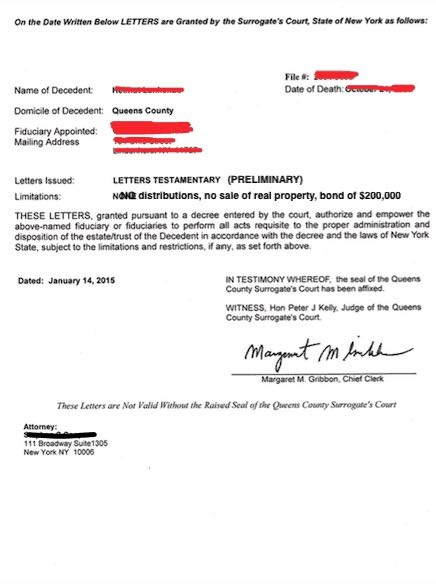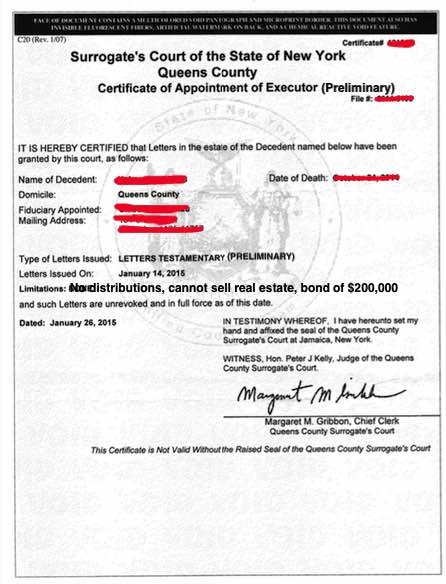Preliminary Letters Testamentary
Preliminary letters testamentary function until the court issues permanent letters testamentary. They do not allow the executor to make any distributions.
Preliminary letters testamentary is an official name for a document issued by the Surrogate’s Court, which authorizes a person to act on behalf of an estate of a person who died with a will until the court issues permanent letters testamentary.
A person who is nominated by a will to be an executor of an estate does not have the power or authority to act on behalf of an estate until they apply for, and are issued, letters testamentary by the Surrogate’s Court. Preliminary letters testamentary are a temporary, limited and restricted version of the full letters. They are typically only good for six months.
In order to get preliminary letters of testamentary, your attorney would file a petition to the Surrogate’s Court asking the court to issue them to you. If you need an attorney, you can send us an email at [email protected] or call us at 212-233-1233.

Here are some of the things a person can do after the court appoints them as an administrator of an estate by Letters Testamentary:
- Obtain a tax id number for an estate from the federal government
- Open an estate bank account
- Request information from banks and other institutions that control the decedent’s assets. The banks will comply if you show them the Letters Testamentary and the death certificate
- Transfer assets from the decedent’s name to the name of the estate
- Pay debts of the decedent
- Collect claims of the decedent
- Marshal assets of the estate
- Defend a foreclosure
- Pay attorneys’ fees (in most cases)
- Start a lawsuit on behalf of the estate
Those things would be impossible to do without Preliminary Letters Testamentary. The banks will not give you information and will not transfer the assets, the county recorder will not record property deeds, and a buyer will not buy a property from you.
You often need more than one, since each bank and government agency would require an original. Also, some institutions require a more official-looking document. This is why the court can also issue a Certificate of Appointment of Preliminary Executor, which is printed on a watermarked blue and red paper and looks similar to a death certificate, birth certificate or marriage certificate.

Most importantly, here is what the preliminary executor cannot do:
- Preliminary Letters Testamentary DO NOT allow you to make distributions
- The preliminary executor has to abide by any other restrictions in the Preliminary Letters
The most common situation when Preliminary Letters Testamentary is issued is in case of a will contest – when someone is alleging that the Will that nominates the Executor is invalid. It can take more than a year for the court to decide if the will is valid. For the time being, a preliminary executor can be appointed so that the estate property is not neglected, and someone is there to manage the estate.
In a will contest, preliminary letters are used to allow the attorneys in the case to obtain medical records in order to determine the capacity of the person who died to make a will.
A will contest is not the only situation when preliminary letters testamentary are needed. They are also used to remedy other delay-producing complications. For example, when some relatives of the decedent cannot be found and permanent letters testamentary cannot be granted until those relatives are found and notified of the proceeding. Or, if witnesses to the will cannot be identified and located.
If there is a delay with the paperwork and there is an urgent situation in the estate, such as where a house is getting into foreclosure or a deadline for an estate’s lawsuit is drawing near, it is best to explain the situation to the Probate Clerk, submit an Affidavit of Urgency and a request for Preliminary Letters Testamentary.
How long does it take to get Preliminary Letters Testamentary? If an Affidavit of Urgency is submitted, the court can issue the Letters the same week, or even the same day.
It is essential not to abuse the Preliminary Letters Testamentary process. Often, it is faster, cheaper, and easier to inform the clerks that urgent action is needed in the estate and to submit an Affidavit of Urgency explaining to the court why Letters Testamentary needs to be issued faster. In situations where the executor needs to maintain the property, pay the bills, evict tenants or manage financial portfolios, it is probably more efficient to expedite permanent Letters Testamentary than to ask the court for Preliminary Letters Testamentary.
The problem is that the courts are getting inundated with these requests, because many practitioners have a practice of requesting Preliminary Letters as a matter of course when they apply for permanent Letters. This creates a “Catch – 22” situation; everyone is asking for Preliminary Letters because they think it makes things faster, but because everyone is asking for it, the court system gets overwhelmed, which slows down everything – both permanent and Preliminary Letters Testamentary.
How to Get Preliminary Letters Testamentary
To apply, one needs to submit a document called “Application for Preliminary Letters Testamentary.” To get them faster, one needs to draft an Affidavit of Urgency, explaining to the court why fast action is necessary.
In the application, the Executor will need to explain the reason they are asking for the Preliminary Letters Testamentary, list the property of the estate, including real property, and estimate the rent which would be collected by the estate for the next 18 months. The Executor will need to provide official notice to everyone involved in the estate, as per the court rules. NY SCPA § 1412 details the procedure for application for Preliminary Letters Testamentary.
The Surrogate’s Court may require the preliminary executor to post a bond before letters testamentary are issued. A bond is like insurance against executor wrongdoing. The court may also restrict the Preliminary Letters Testamentary, for example, restricting the executor from selling real property.
Preliminary Letters Testamentary does not grant authority to distribute property, only to take control of the estate’s property, manage it and to pay legitimate debts of the estate.
Do You Need a Good Reason to Get Preliminary Letters Testamentary
If you have a valid reason to get preliminary letters testamentary, then the court may grant them to you in a preferential time frame. For example, if an estate will incur damage, or a property is going into a foreclosure. Or if there are parties that need to be located and it would take a long time to locate them. If you do not have a significant reason and are just trying to jump the line ahead of other people who submitted an application for letters testamentary, then the court may choose to ignore your application for preliminary letters testamentary and not grant them to you.
How Long Does it Take to Get Preliminary Letters Testamentary
It is hard to tell how long it would take to receive preliminary letters testamentary. The idea is that you would receive them faster than it would take for the court to grant you the full letters testamentary.
If you need a New York estate lawyer, we at the Law Offices of Albert Goodwin are here for you. We have offices in New York City, Brooklyn, NY and Queens, NY. You can call us at 212-233-1233 or send us an email at [email protected].













